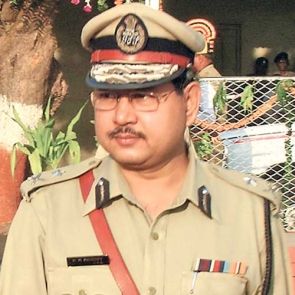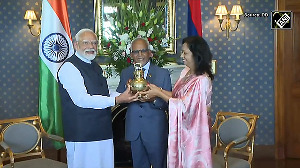
Absconding senior Gujarat IPS officer P P Pandey, an accused in the Ishrat Jahan encounter case, on Monday made a dramatic appearance on a stretcher in a CBI court, which granted him anticipatory bail till July 31.
Special CBI judge Gita Gopi granted Pandey, who had filed pre-arrest bail plea, temporary relief and asked him to appear before Additional Chief Judicial Magistrate H S Khutwad, where charge sheet has been filed, on Wednesday.
The Additional Director General of Police (ADGP) rank officer had been absconding since February after his name surfaced in the 2004 encounter case.
Earlier in the day, Pandey, who was last week directed by the Supreme Court to appear before the trial court, got himself admitted to a private hospital after complaining of chest pain.
Later, he was brought to the court in an ambulance and taken before the judge on a stretcher. Pandey's lawyer Nirupam Nanavati submitted a note, saying his client has appeared in the court on the apex court's direction.
Pandey was named in the CBI charge sheet for the alleged extra-judicial killing of Mumbai teenager Ishrat, her friend Javed Sheikh alias Pranesh Pillai, and Amjad Ali Rana and Jishan Johar, said to be Pakistani nationals.
Besides Pandey, six other Gujarat policemen figure in the charge sheet filed on July 3. All the accused have been charged with murder and criminal conspiracy.
The central agency, investigating the case, has in the document claimed the encounter was "fake" and jointly carried out by Gujarat Police with Intelligence Bureau.
The magistrate's court, while declaring Pandey as a proclaimed absconder last month, had told him to appear before it by July 31 or else his properties would be attached.
Pandey, in the meantime, had approached Gujarat high court and also Supreme Court, which declined to give him any major relief.
Besides citing medical grounds, Pandey, in his plea, has maintained that as the charge sheet has been filed, his arrest or custodial interrogation was not required.
His lawyer Nanavati submitted that the courts do not appreciate investigating agencies making arrest for the sake of arrest.
Nanavati further said there was no question of his client tampering with evidence as the charge sheet has already been filed in the case.
He submitted that the CBI document, which says the encounter was "fake", is a "fanciful imagination of the investigating agency" as no material evidence has been placed to support the conclusion.
CBI lawyer Indira Jaising strongly opposed Nanavati's claims and demanded that Pandey be immediately taken into custody.
Jaising said the IPS officer was declared a proclaimed absconder by the court as, instead of cooperating with investigation, he had gone underground. This was not expected from an officer of the ADGP rank, who should abide by law.
The CBI counsel further argued the fact that the four victims were in prior custody of the police and killed in cold blood is the ground enough for the arrest of the accused.
She further said entertaining the anticipatory bail plea f the accused will be abuse of process of law and also upreme Court order.
The apex court had directed the 1982-batch IPS officer to ppear before the trial court in Ahmedabad on July 29 and restrained the CBI from arresting him till then.
Pandey, as Joint Commissioner of Police, Ahmedabad, was heading the Crime Branch when the encounter took place on June 15, 2004 on the city's outskirts. Ahmedabad Crime Branch had then claimed the deceased were terrorists.











 © 2025
© 2025